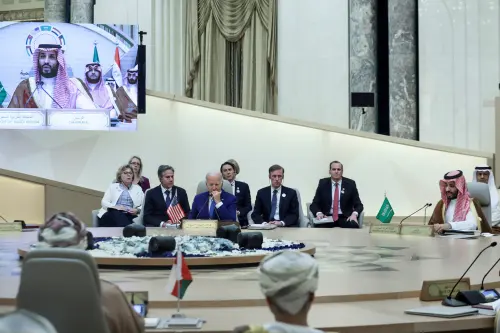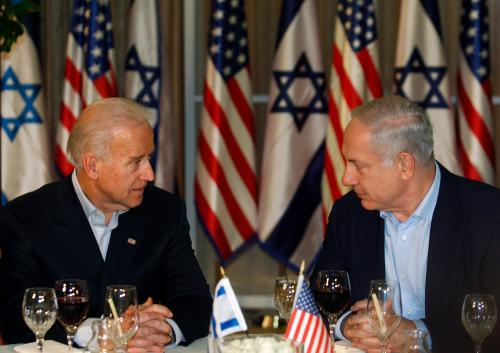Content from the Brookings Doha Center is now archived. In September 2021, after 14 years of impactful partnership, Brookings and the Brookings Doha Center announced that they were ending their affiliation. The Brookings Doha Center is now the Middle East Council on Global Affairs, a separate public policy institution based in Qatar.
US report finds Saudi crown prince approved Khashoggi murder: Saudi Arabia’s de facto ruler approved an operation to capture or kill murdered journalist Jamal Khashoggi in 2018, according to U.S. intelligence released on February 26 as the United States imposed sanctions on some of those involved but spared the crown prince himself in an effort to preserve relations with the kingdom. Saudi Arabia said it rejected completely “the negative, false and unacceptable” assessment of the U.S. intelligence report.
Gulf states impose new restrictions to stem virus surge: In early February, Gulf Arab states launched new restrictions over fears of the coronavirus resurging across their countries. Dubai announced February 1 it would close all bars and pubs for the entire month of February and limit other activities after a spike in cases followed New Year’s Eve celebrations that drew visitors from around the world. Qatar similarly announced new restrictions February 3, while in Saudi Arabia, officials ordered all weddings and parties suspended and closed down all shopping malls, gyms and other locations, starting February 4. In Kuwait, authorities ordered a two-week ban on foreigners arriving to the country and limited the hours of most businesses, beginning February 7.
Biden halts US support for Saudi intervention in Yemen: On February 4, President Joe Biden declared a halt to U.S. support for the Saudi Arabia-led military campaign in Yemen, demanding that the more than six-year war, widely seen as a proxy conflict between Saudi Arabia and Iran, “has to end.” Biden also named veteran U.S. diplomat Timothy Lenderking as the U.S. special envoy for Yemen in a bid to step up American diplomacy “to end the war in Yemen, a war which has created humanitarian and strategic catastrophe.”
Saudi Arabia releases prominent women’s rights activist: Prominent women’s rights activist Loujain al-Hathloul was released from a Saudi prison after nearly three years behind bars, her family said on February 10, a case that has drawn international condemnation. Al-Hathloul’s sisters said on February 11 they wanted real justice for her, and the lifting of a travel ban.
UAE’s 1st mission to Mars enters orbit: The United Arab Emirates’ first mission to Mars reached the red planet and entered orbit on February 9 after a seven-month, 494 million-km (307 million-mile) journey, allowing it to start sending data about the Martian atmosphere and climate. On February 14, the country published the first image from its Mars probe.
Detained Dubai princess sends new video message: A daughter of Dubai’s powerful ruler who tried to flee the country in 2018 only to be detained by commandos in a boat off India has re-emerged in new videos published February 16, saying she doesn’t know if she’s “going to survive this situation.” The United Arab Emirates said on February 19 that Sheikha Latifa was being cared for at home as the U.N. human rights watchdog asked the UAE for proof that she is alive amid growing international concern about her fate. Meanwhile, police in eastern England said they had received a long-delayed letter from the princess asking them to investigate the disappearance of her sister 20 years ago.
UAE, Qatar meet for 1st time since end of rift: Delegations from the United Arab Emirates and Qatar met in Kuwait on February 22 for the first time since an agreement earlier this year to end a rift of more than three years, the UAE state news agency WAM said. Saudi Arabia, the UAE, Bahrain, and Egypt agreed in January at a summit in Saudi’s Al-Ula to restore diplomatic, trade, and travel ties with Doha, which had been severed in 2017 over accusations that Qatar supported terrorism, a charge it denies.
Bahrain becomes 1st country to authorize J&J vaccine: On February 25, Bahrain became the first nation to authorize Johnson & Johnson’s new single-dose coronavirus vaccine for emergency use, the government announced, just a day after U.S. regulators concluded the shot offers strong protection against severe COVID-19. The island kingdom off the coast of Saudi Arabia said it would dole out J&J’s shot to the most vulnerable people, including older adults and those with chronic conditions, without specifying when.
The Brookings Institution is committed to quality, independence, and impact.
We are supported by a diverse array of funders. In line with our values and policies, each Brookings publication represents the sole views of its author(s).


Commentary
GCC News Roundup: US report finds Saudi crown prince approved Khashoggi murder, Gulf states impose new restrictions to stem virus surge (February 1-28)
March 8, 2021